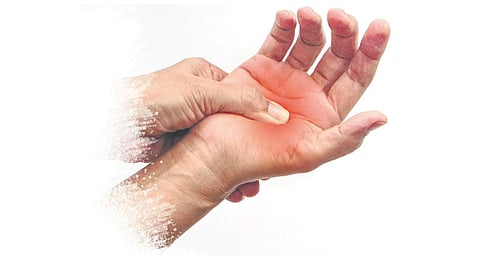

THIRUVANANTHAPURAM: Earlier this year, Helen Monai achieved a monumental feat by scaling the Everest Base Camp. For the 29-year-old IT professional, it was a giant leap as eight years back Helen was struggling to even get up from bed or perform simple daily routines. She was suffering from rheumatoid arthritis.
Rheumatoid arthritis is an autoimmune form of arthritis where the immune system attacks healthy joint tissues, causing it to swell and become tender, in one or more joints. Most forms of arthritis are caused by a fault in the immune system. This may be inherited genetically while some other forms are caused by a metabolic condition. Awareness of the disease and the timely intervention of a rheumatologist proved to be life-changing for Helen. With the support of her family, she sought the expertise of a doctor and began treatment before her condition deteriorated. Early diagnosis and proper management paved the way for her remarkable recovery, allowing her to scale the Everest Base Camp.
Not many are aware of this health condition caused by arthritis and often leads to people mistaking it for regular joint pain and resorting to pain management through painkillers and ointments. Without proper treatment, the condition worsens progressively, severely affecting one’s quality of life. As many are not familiar with rheumatology, which is a relatively new branch of modern medicine, they usually go to an orthopedician or a physician. A rheumatologist is usually found in a tertiary or a referral hospital. Arthritis is not a disease in itself, but a symptom of trouble inside the body. Delay in treatment can increase the risk.
“Early diagnosis of the underlying disease is the key to a successful treatment outcome. Patients who start treatment early can lead a normal life,” said Dr Padmanabha Shenoy, rheumatologist and MD of Dr. Shenoy’s CARE in Kochi. He pointed out instances where patients who were bedridden for four to six years made a comeback.
However, the situation was not the same as 25 years back. “A person becomes bedridden in five to ten years after the symptoms appear. They used to think that their life was over and confine themselves to the four walls of the room. If women in their productive age of 30’s are affected, it has a ripple effect on their families,” said Shenoy. He added that women are more predisposed to autoimmune diseases such as rheumatoid arthritis.
Autoimmune conditions like rheumatoid arthritis, lupus and vasculitis can affect any age group regardless of gender. Lupus commonly affects young women. “When associated with antiphospholipid antibody syndrome, lupus can result in recurrent abortions as well. Even though lupus is incurable, it can be well controlled with timely diagnosis and proper treatment, and patients can lead a normal healthy life,” said Dr Abitha Aliyar, associate consultant and rheumatologist at KIMS Health, Thiruvananthapuram.
Bhubaneswar-based senior orthopaedic surgeon Dr Basanta Behera said there are different physical therapies available for the treatment of arthritis. The basic aim is to prevent the development of deformity in joints by giving different splints and mobilisation of joints by physiotherapists.
“When joints like knee, hip, elbows and shoulder are damaged due to arthritis, joint replacement is the way out for complete recovery. People should also focus on a good and balanced diet and take fresh fruits, fresh green vegetables and food having antioxidants and avoid junk food or fast food. Reduction of weight must be prioritised,” Dr Behera added. A study conducted by Dr Shenoy found that awareness about arthritis and its complications is relatively low as the average delay for diagnosis was 60 months in 2010. It has come down to 24 months, but health experts want to bring it down further.
Experts say that better awareness of the disease and treatment would usher in a sea of difference in the life of patients. “The chances of misdiagnosis or underdiagnosis are very common. Doctors at the primary care level need to be sensitised about the disease till the patient-rheumatologist ratio improves,” said Dr Abitha.
(With inputs from Hemant Kumar Rout @Bhubaneswar)